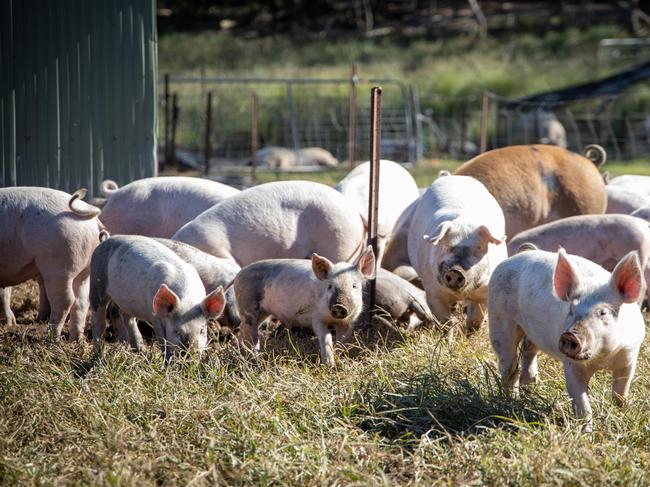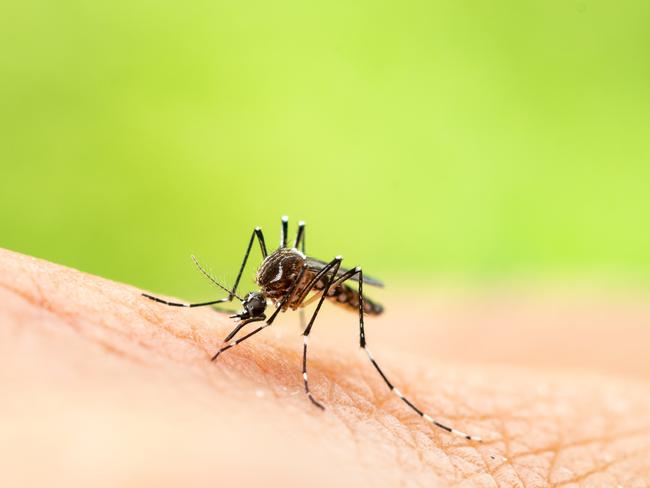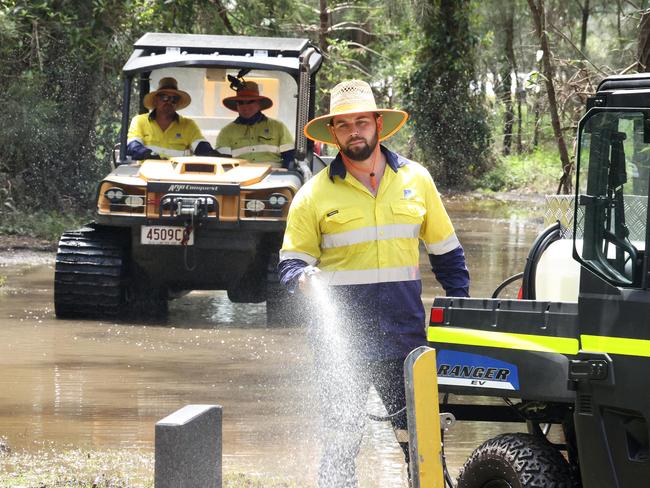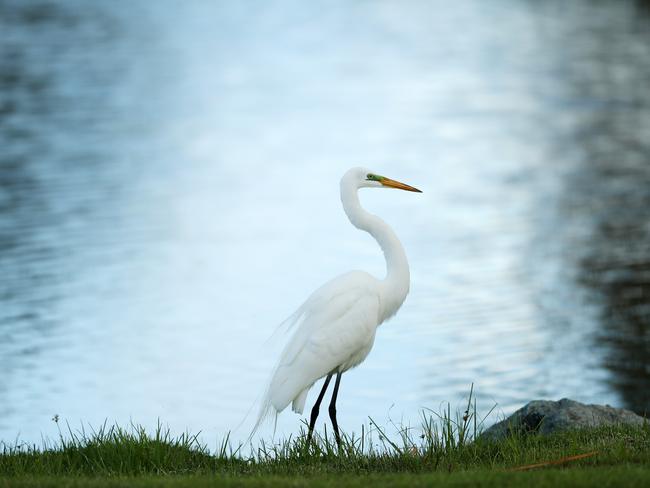What you need to know about Japanese encephalitis virus
Two people are in the ICU with a rare mosquito-borne virus, as the government urges people not to “panic” but be “alarmed”. Here’s how to protect yourself.
Illness
Don't miss out on the headlines from Illness. Followed categories will be added to My News.
Two people are in intensive care with Japanese encephalitis virus, as the federal government urges Australians not to “panic” but be “alarmed” about the spread of the potentially fatal mosquito-borne disease in flood-affected communities.
Japanese encephalitis virus (JEV) spreads in pigs and waterbirds, and is transmitted to humans via infected mosquitoes. It cannot be transmitted from human to human, and cannot be caught from eating pork or pig products.
The virus, which first arrived in northern Australia in the ‘90s, has made its way down the eastern seaboard due to extreme wet weather and has now been detected in more than 40 piggeries across Queensland, NSW and Victoria over the past month.
While less than 1 per cent of people who contract JEV will show any symptoms, around 20 per cent of those who do may experience serious neurological disease, in some cases leading to permanent complications and even death.
“We shouldn’t panic but we should be alarmed,” federal Agriculture Minister David Littleproud told 2GB radio on Tuesday.
“It’s quite serious and let me tell you it is a concern for human health, but it shouldn’t be something that is paramount. There is a community that’s at most risk and we are working with them around vaccine. We’re going in on a targeted approach of those at most risk.”
Mr Littleproud said Australia already had around 6000 JEV vaccines prior to the outbreak and was acquiring another 6000 from South Korea, with “hundreds of thousands” more doses being purchased from Thailand.

“If you’re in the pork industry, what we’re saying to you is we’ll have a vaccine for you. If you want to have that you can to protect yourself,” he said.
“This is a very serious virus for a small portion of the population. You should not be [thinking this is a] ‘she’ll be right’ sort of situation. This is serious. If we can contain it we will, but this is the challenge we’ve got.”
NSW Health said on Monday two residents from the NSW-Victoria border region with JEV were currently being treated in Victorian hospitals – a man from the Corowa area and a child from the Wentworth area in the far southwest of NSW.
“The man remains in a serious condition in ICU,” NSW Health said.
“The child has been discharged from ICU but continues to receive hospital care due to the serious nature of their illness. Several more people in NSW are undergoing further testing, and more cases are expected to be confirmed over the coming days and weeks.”
Queensland Health last week confirmed a woman in her 60s had been placed on life support and was in critical condition after contracting the disease.
Australia’s acting chief medical officer Dr Sonya Bennett has declared the unfolding JEV outbreak a “communicable disease incident of national significance”.
“A national working group of communicable disease, vaccine and arbovirus experts has been established to support the response, including mosquito surveillance and control measures and identification of those at direct risk, and for the rollout of vaccines,” Dr Bennett said last week. “Public health communications regarding mosquito protection will target affected communities.”

What is Japanese encephalitis?
Japanese encephalitis is a rare disease caused by the Japanese encephalitis virus. JEV is present through most of Asia and parts of the western Pacific.
The disease was first documented in Japan in 1871.
The World Health Organisation estimates around 68,000 cases occur each year, causing between 13,600 to 20,400 deaths. It primarily affects children, as adults in countries where the virus is present develop natural immunity after childhood infection.
It largely spreads in rural, rice-growing communities in South-East Asia where mosquitoes spread the infection from domestic pigs.
JEV was first detected in northern Australia in 1995 after three cases, including two deaths, were recorded in the Torres Strait Islands. It reached the mainland in 1998 when it was detected in Cairns.
Since that time, the virus has only popped up sporadically in Australia, and always in Far North Queensland.

Why is it spreading now?
Mr Littleproud blamed the wet weather for JEV’s “march across the eastern seaboard and even in South Australia”.
“It spread from northern Australia because of the wet weather, and it’s come from migratory birds,” he said.
“Those migratory birds have now found some water in western Queensland and right down the east coast into South Australia.”
According to Queensland Health, waterbirds such as herons and egrets are the “main source from which transmission of JEV can occur” as they can hold enough virus in their blood to infect mosquitoes for up to seven days.
Pigs are also “major amplifiers” as they develop enough virus in their blood to infect mosquitoes for around four days.
“They are important amplifying hosts and hold enough virus in their blood to infect vectors for one to seven days,” it says.
“Horses and a wide range of other species may be infected but do not develop levels of virus in the blood sufficient to infect mosquitoes, so are not involved in maintaining disease in an area.”
The wet weather and catastrophic flooding affecting much of the east coast is adding to fears of wider transmission from increased mosquito numbers.
“It can be contained, it can be looked after, but we just need to be vigilant for probably the next couple of months until the floodwaters abate, it gets drier, it gets colder and we’ll be OK,” Mr Littleproud said.

What are the symptoms?
The vast majority of JEV infections cause no symptoms.
Others may experience flu-like symptoms such as fever, headache and vomiting.
“Those with a severe infection may experience neck stiffness, disorientation, tremors, coma, convulsions (especially in children) and paralysis,” NSW Health says.
If symptoms do occur, they generally develop from five to 15 days after being bitten by infected mosquitoes.
Mr Littleproud said it was everyone’s “responsibility as a citizen” to see their doctor if they got sick, so health authorities could test for JEV and track the spread of the outbreak.
“If you get symptoms of fever, vomiting, actually even a stiff neck, you need to go to your doctor and tell them the symptoms you’ve got,” he said.
“Most of these risk areas [around the piggeries identified], if you’re in that area they know to actually test you. That’s important, because what we will do from that data is understand if you’ve got it and whether that’s a risk to the broader community.”
He added, “So your responsibility as a citizen is if you get sick, you vomit or think you’ve got flu-like symptoms, is simply go to the doctor and get them to test you … so we know where the risk areas are.”

How can I protect myself?
Health authorities say the best way people can protect themselves is to avoid being bitten by mosquitoes, which are most active around dusk and dawn.
“NSW Health is cautioning people undertaking outdoor activities such as camping and fishing to carefully consider their plans,” NSW Health acting chief health officer Dr Marianne Gale said last week.
“This is especially important for people planning activities near waterways or where mosquitoes are present, particularly the Murray River and its branches. People should be particularly vigilant given the recent wet weather conditions, which have led to very high mosquito numbers that may increase further in the coming days and weeks.”
Queensland Health recommends “regularly applying insect repellent containing Diethyl Toluamide (DEET), Picaridin, or oil of lemon eucalyptus, wearing loose, light-coloured clothing to cover arms, legs and feet, and using other insecticide-based mosquito control devices where possible when outside”.
NSW Health says mosquito coils and other devices that release insecticides can assist reducing mosquito bites but should be used in combination with topical insect repellents.
“Reduce all water holding containers around the home where mosquitoes could breed,” it says. “Mosquitoes only need a small amount of liquid to breed.”
Speaking to ABC Radio National on Monday, Mr Littleproud urged Australians to douse themselves with repellent.
“The best thing they can do is obviously use as much repellent as they can, they can also have clothing that covers up most of their arms and legs, and basically remain vigilant,” he said.
“What we’re saying, particularly those in high-risk areas, to be very careful about this, the best thing you can do to arm yourself without a vaccine is to use as much repellent as you possibly can.”
Originally published as What you need to know about Japanese encephalitis virus





